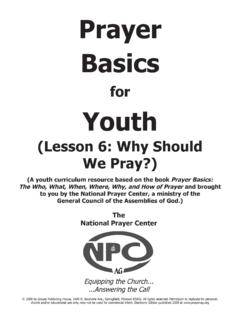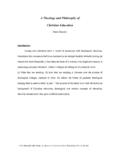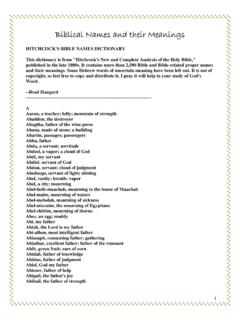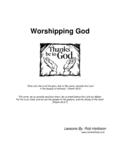Transcription of The Apostolic and Prophetic Foundation - Jim McKinley
1 I strongly recommend this bookto every church leader who iseither involved in or movingtoward biblical eldership. Itdoes not focus on the structuralissues concerning elder-ledassemblies but instead focuseson the spiritual issues. I considerit a must read. If you would liketo obtain a copy of the book inpaperback, it can be ordered HustonThe Apostolic andProphetic Foundation by Donald Rumble Contents INTRODUCTION ..15 Chapter 1: THE Apostolic ..19 Gathering Unto Men Or Unto Christ? The Two-fold Apostolic Task Chapter 2: Apostolic Apostles and the Apostolic Church * Men of Revelation * Called by God Men of Power * Bondservants * Placed First and Exhibited Last Chapter 3: Apostolic Equip the Saints * Implementers and Articulators Chapter 4: SWEEPING AWAY THE Laying the Foundation * Removing Strongholds: False Teachers Strongholds and Insecurity * The Organization * Beholding His Glory Chapter 5: LOSING Breaking Out of Our Comfort Zone * Who's Preserving Who?
2 Jesus Christ, the Sufficient Foundation * Administering the Mystery Chapter 6: WHAT ABOUT ELDERS?..66 Individual and Collective foundations * Eldership * 1. Servants Who Lead the Flock by Example * 2. Oversee the Functioning of Christ s Body Chapter 7: APOSTLES, ELDERS AND THE LOCAL Who is the Greatest? * Apostles and Elders * Honoring Jesus as the Head Chapter 8: SERVANTS AND Exalting Men * Building Wisely * Under Rowers * Stewards of God s Mysteries * The Mystery of Christ Chapter 9: A LOOK AT THE A Costly Calling * Interpreting Prophecy Chapter 10: PROPHETS: LAYING Prophets: A Foundational Ministry * Watchmen Chapter 11: PROPHETS: SERVANTS IN THE ..118 Prophetic Frustration * Understanding God s Order * Gifting and Relationship * The Church - Apostolic and Prophetic Chapter 12: ACCORDING TO THE PATTERN?..127 The Superiority of Christ * Entering His Rest * God s Oracles * The Pattern Chapter 13: BUILT BY Free Will Offerings * Needs and Service * Building by Wisdom Chapter 14: DRESSING FOR THE LORD S The Goal of God s Judgments: A Prepared Bride * Proper Values * Jesus - Center Stage * Mammon and Beauty * Corrupted Theology * Dressing for the Lord s Day NOTES.
3 155 PRAYERS ..156 Introduction This book is intended to contribute to the growing body of literature on the theme of apostles and prophets. Whenever God restores truth, it is so the Church will experientially grow into the reality of what He is revealing. We have heard His emphasis concerning the restoration of these ministries and our response has been to verbalize it. This is good. We have also tried to implement it. This is also good, but it has had mixed results. A danger lies in believing we fully possess what we are speaking about. Having correct terminology is not the same as walking in what God intended when He spoke. His intent and our perspective of His intent are often not the same thing. We know in part and are participating in an unfolding revelation of His person and purpose. He has much to reveal that we are not yet ready to receive. Today God is restoring these ministries to the Church and Apostolic terminology abounds.
4 However, we may not be as far along as we believe. When Paul wrote to the Corinthian church, his concern was not only what they built but also how they were building. But let each one take heed how he (1 Cor. 3:10) Gold, silver and precious stones have to do not only with what is being constructed but more importantly with the way it is being done. Jesus is the way, the truth and the life ( :6). Many church leaders in our day point to what is occurring in their midst as a sign of God s approval. People are being saved, numbers are increasing, elders function in team ministry, etc. However, as positive as these ingredients of church life appear, the question before us is whether or not we are learning and walking in God s ways ( :7). Today we stand at the end of the Charismatic renewal. That particular wave of God s visitation has swept in from the ocean of His purpose and has now receded back again.
5 Left in its wake are all the structures that have been built in the last twenty to twenty five years. Many of these church forms are important. However, the idea that these structures will be sufficient to contain what He is beginning to do is questionable. This raises the question, Where is our commitment? Is it to that which has been built or is it to Him who led us in the construction process? It is true that we have come to understand certain aspects of moving in the Spirit. We have tasted an anointing for service, and God has blessed much that we have done. However, many of us have found our identity in our ministry. The words, elder , pastor , prophet , teacher , deacon , etc. have come to have significance when we think of who and what we are in God s house. Here is an interesting question: What if He asked us to lay those terms aside? What if we had to function in God s house without them?
6 What if we only had the grace and anointing of God coupled with the people s recognition of that anointing?1 If we did not have the title of elder , pastor , etc., as a basis for why people should listen to us, would we still have authority in their sight? This is a crucial question. Are we training believers to respond to the Lord, or simply to men holding a position in the church? If the removal of titles changes the way we function, then I submit to you that perhaps our authority has become more positional than functional. Our activity has become more a reflection of what people expect of us rather than the leading of the Holy Spirit. In other words, the structure that formed over time through God s operative grace in us gradually began to take precedence over the activity of God Himself. As a result, we have become stuck in a mold that seems to express order, but is in fact a restraint upon the initiatives of God.
7 At this point, corporate arthritis has set in. This is a recipe for future shaking. When the next wave of visitation arrives believers may well be motivated more to accomplish certain tasks within a set structure than to respond to God s voice. Sadly, many today point to such activity as a mark of successful building; they are equipping the saints. No wonder Paul said that we must take heed how we build (1 Cor. 3:10)! Lord, help us to wholeheartedly give ourselves to hearing and responding to You. By Your grace, continue to structure Your house through the initiatives of Your Holy Spirit in our midst. In Jesus name. Amen. 1 I am not suggesting that we actually get rid of these biblical terms. My question is rhetorical and is meant to stir an examination of how we function with their use in the Church. 1 The Apostolic Task Gathering Unto Men or Unto Christ?
8 Paul s initial topic in his first epistle to the Corinthians concerns how an unhealthy view of the importance of men had divided the church at Corinth. Some were saying that they were of Paul, some of Apollos, and so on. Chapters 1 and 2 of the apostle s letter reveal why there is no basis to elevate men in such a manner. For you see your calling, brethren, that not many wise according to the flesh, not many mighty, not many noble, are called. But God has chosen the foolish things of the world to put to shame the wise, and God has chosen the weak things of the world to put to shame the things which are mighty; that no flesh should glory in His presence. (1 Cor. 1:26, 27, 29) The Foundation of a church is not based on the might nor the wisdom of men; it is based on Christ who is both the power and wisdom of God (1 Cor. 1:24). Whenever a leader expresses godly wisdom, it is easy for others to think that he is very wise.
9 If he is not quick to give all glory to Jesus, the Foundation is obscured. Jesus is not seen as the source. People are then attracted to the speaker more than to Him who is the Wisdom of God. This leads to God s people gathering around men rather than being built upon Christ. Paul made it clear to the Corinthians that it was not his wisdom or power that established them. I was with you in speech and my preaching were not with persuasive words of human your faith should not be in the wisdom of men but in the power of God. (1 Cor. 2:3 - 5) The wisdom seen in Paul was of God. The world simply could not understand it. Such wisdom has not so much to do with the qualities of the man speaking as it does with the One anointing him to speak. If ministries are not faithful to point this out, they will build followings around themselves and the Church will be weakened. Today, such man-centeredness is a very real problem.
10 In any given locality, we can find sects and groups, each with its own prominent leader(s). The united house of God is not in evidence; instead, divisions abound in the Lord s Church. It is interesting to note that Paul began his epistle by dealing with this topic instead of the problem of sexual immorality (1 Cor. 5). I wonder how many in our day really understand this priority. It appears that none of the other truths of Paul s letter to Corinth could be adequately covered until this issue was first addressed. Today, many Christian leaders are urging the Church to be more involved in social and political issues. Our responsibilities to the society in which we live are emphasized without seeing how our divisions undermine the message of life that society desperately needs to hear. We must come back to this foundational issue. In city after city, there does not exist a united church.









